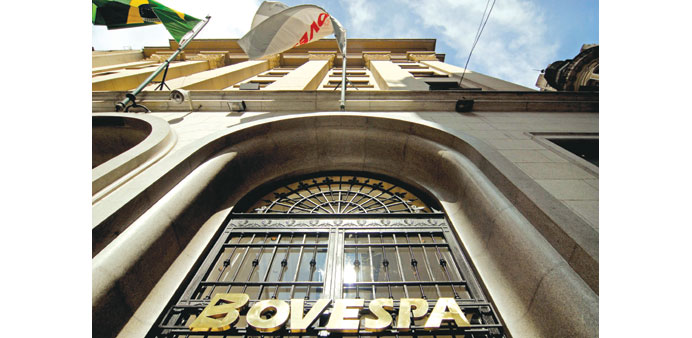Flags fly outside the Sao Paulo Exchange or Bovespa in Brazil. Back in its 2007 heyday, Brazil’s stock market averaged an initial public offering a week. Now, with stocks and the real tumbling in a stagnant economy, companies are increasingly going in the opposite direction.
Bloomberg/Sao Paulo
Back in its 2007 heyday, Brazil’s stock market averaged an initial public offering a week. Now, with stocks and the real tumbling in a stagnant economy, companies are increasingly going in the opposite direction.
Foreign Corps from British American Tobacco to America Movil SAB have announced at least $7.4bn in stake buybacks of Brazilian companies in the past year. That’s more than any other 12-month period on record, data compiled by Bloomberg show.
At the heart of the delisting trend is the pursuit of bargains: a broad market selloff has erased $197bn from the Brazilian stock market in the past six months, cheapening even stocks with promising earnings outlook. While forecasts for an economic contraction this year are spooking stock traders, corporate executives with a longer-term outlook see a chance to re-absorb Brazilian businesses at attractive prices.
“For strategic investors – company owners with a very clear sense of the value of their units – Brazil looks cheap,” said Marcio Guedes, a Sao Paulo-based investment banker with Pangea Partners.
Brazil’s currency fell to a 10-year low against the dollar in March, and the Ibovespa has plummeted 13% from last year’s high in September.
Souza Cruz’s enterprise value dipped to a four-year low relative to earnings before interest, taxes, depreciation and amortization before the cigarette maker’s parent BAT announced its $3.5bn delisting plan in March.
Next up for privatisation may be highway operator Arteris. The company – which is controlled by a consortium of Spain’s Abertis Infraestructuras and a unit of Toronto-based Brookfield Asset Management Inc - hasn’t been this cheap since 2009. Controlling shareholders at Abertis and Brookfield would need only about $200mn for an Arteris delisting, assuming a 20% premium, according to a March 4 report from Banco Bradesco, by analysts including Victor Mizusaki.
“Besides the clear economic incentives, in our opinion, Abertis and Brookfield have all the information to evaluate the capex risk and increase their investment in this company,” the Bradesco analysts wrote.
America Movil’s repurchase of its Brazil-traded stocks was part of a broader move to combine its wireless and landline businesses in the country.
While Brazilian bargains may give foreign parent companies good reason to want to buy back stakes, minority investors are often displeased to see their stocks taken private at a perceived discount. James Gulbrandsen, a Rio de Janeiro-based partner and chief investment officer at NCH Brazil, which holds Souza Cruz stock, said he wants BAT to desist from its purchase.
“The price they’re offering is nowhere close to what the true intrinsic value of the company is,” he said in a telephone interview from Rio de Janeiro. “It feels very much like taking advantage of minority shareholders.”
Souza Cruz shareholders this month approved the hiring of Credit Suisse Group to carry out a new valuation of the company before proceeding with the privatisation offer. The current offer, set out in a March 24 regulatory filing, is for 26.13 reais a share.
“We believe our original offer represents full and fair price,” BAT spokesman Will Hill said by e-mail. “We are aware of the second evaluation taking place, and we look forward to reviewing the results once they become available.”
Souza Cruz didn’t respond to a request for comment.
Local companies are getting involved in privatisation efforts, too. Sao Paulo-based Grupo BTG Pactual teamed up with Brookfield Property Group in February to take BR Properties private, with the duo citing cheap valuations as their motivation.
Eminence Capital said in a March 26 statement that the offer is “grossly inadequate in price and structurally coercive.” The $6.4bn investment firm disclosed a 14% stake in the company last month, and said it may add to its holdings to protect the rights of investors.
In an e-mailed response to questions, Eminence Chief Executive Officer Ricky Sandler said he feels confident that the local stock market regulator and the independent committee of the board of directors will protect the company’s rights as minority shareholders. So, too, will a poison pill bylaw that helps investors to block an “inadequate offer,” according to Eminence.
“This trend of going-private offers by controlling or major shareholders will certainly serve as a test of the maturity of the Brazilian capital markets and the protections afforded to minority shareholders, which many times include international-seasoned investors,” Sandler said.
BTG and CVM declined to comment, while BR Properties didn’t respond to a request for comment.
Cheap assets are also attracting interest from private- equity firms, said Renato Ejnisman, deputy executive director overseeing Banco Bradesco’s investment banking and brokerage business.

